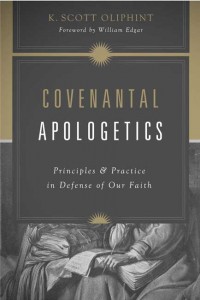Intellectual Contest or Spiritual Battle?

October 21, 2013
 I love moving through a book that makes me stop and think. K. Scott Oliphint’s Covenantal Apologetics has been that way for me. I’ve had some other projects going on, so I have been returning to this book in between. Reading through it is kind of like taking a course. There are so many papers and assignments that I could envision coming from it.
Oliphint covers the theology of persuasion quite thoroughly in Chapter 4. His demonstration of Paul’s covenantal apologetics in his address to the Areopagus (Acts 17:22-34 ) gave me much to think about. Even so, one might feel overwhelmed with the trivium of education, the theological trivium, and the trivium of persuasion, no matter how well he teaches them. My responsibility to defend the faith was weighing pretty heavy. I have my own character to consider (ethos), a good understanding of where my conversation partner or audience is coming from (pathos), as well as the content that I am trying to communicate (logos).
And yet, Oliphint makes an important and relieving point in his conclusion of the chapter. Apologetics isn’t an intellectual battle, it is a spiritual one. So, how do we measure our success when defending our faith to others, and trying to persuade them of its truth? Was Paul successful on Mars Hill? The results of his speech show a mixed response. Several believed, some wanted to hear more, and others continued to mock him. How would a modern-day evangelist feel about these results? It’s hardly news worthy.
Oliphint encourages us:
I love moving through a book that makes me stop and think. K. Scott Oliphint’s Covenantal Apologetics has been that way for me. I’ve had some other projects going on, so I have been returning to this book in between. Reading through it is kind of like taking a course. There are so many papers and assignments that I could envision coming from it.
Oliphint covers the theology of persuasion quite thoroughly in Chapter 4. His demonstration of Paul’s covenantal apologetics in his address to the Areopagus (Acts 17:22-34 ) gave me much to think about. Even so, one might feel overwhelmed with the trivium of education, the theological trivium, and the trivium of persuasion, no matter how well he teaches them. My responsibility to defend the faith was weighing pretty heavy. I have my own character to consider (ethos), a good understanding of where my conversation partner or audience is coming from (pathos), as well as the content that I am trying to communicate (logos).
And yet, Oliphint makes an important and relieving point in his conclusion of the chapter. Apologetics isn’t an intellectual battle, it is a spiritual one. So, how do we measure our success when defending our faith to others, and trying to persuade them of its truth? Was Paul successful on Mars Hill? The results of his speech show a mixed response. Several believed, some wanted to hear more, and others continued to mock him. How would a modern-day evangelist feel about these results? It’s hardly news worthy.
Oliphint encourages us:
But Paul was successful in that he communicated the truth of God. In our defense of Christianity, we are successful to the extent that what we say comports with what God has said in his Word. Our goal in a covenantal apologetic cannot be the conversion of those to whom we speak. That is a goal that we cannot accomplish. It is our prayer, but should not be our goal. Rather, our goal is to communicate, as persuasively as we are able, the truth of God himself, as that truth finds its focus in the Word who became flesh and dwelt among us… We are not in an intellectual contest when we do apologetics. We are in a spiritual battle in which only the Spirit of Christ can conquer the true enemy. (159)This reminder is so liberating, isn’t it? With this in mind, I am even more compelled to present the gospel to others in the best way I can. I want to know God’s Word well enough to apply it to those whom I am speaking. I want to have character that demonstrates the power of Christ in my life. I want to put forth the effort to know and understand the thoughts and concerns of others. But I also understand that I’m not working with a blank slate, as Oliphint puts it. God has already been communicating to them by natural revelation. His creation is continuously proclaiming his existence and his goodness. I am speaking with covenantal beings who are “at war with [their] true identity” (45). Unbelievers suppress the truth in unrighteousness (Rom. 1:18 ), and we are to expose this truth of their rebellion against the living God. I am unsuccessful if I do not communicate God’s truth. But God is always successful in bringing about the results that he has purposed. I am so thankful that he has given me eyes to see and ears to hear his mighty holiness and his wonderful message of salvation.




